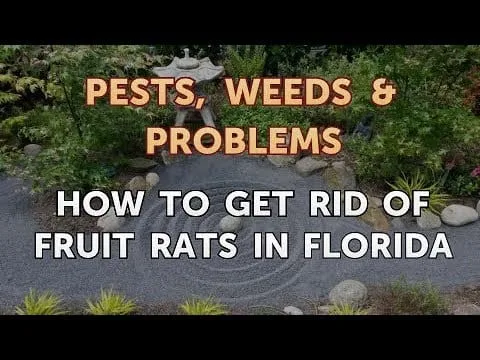Fruit rats are a common problem in Florida, especially during the summer months when the warmer weather creates an ideal environment for them to thrive. Unfortunately, these rodents can cause significant damage to crops and property if left unchecked. If you’re dealing with a fruit rat problem in Florida, there are several steps you can take to get rid of them quickly and effectively. In this article, we’ll discuss how to identify fruit rats, the various methods available for eliminating them, and tips for preventing future infestations.Identifying fruit rats in Florida requires careful observation of their physical characteristics and behaviors. The most commonly found fruit rat in Florida is the roof rat (Rattus rattus). These rats are typically black or brown in color with large, hairless ears, a long tail, and a pointed nose. They also have prominent eyes and a white underside. Roof rats tend to be active at night and can often be found in trees, attics, and other elevated areas. Other species of fruit rats that can be found in Florida include the cotton rat (Sigmodon hispidus), the marsh rice rat (Oryzomys palustris), and the oldfield mouse (Peromyscus polionotus). These species can be identified by their grey-brown fur, white underbellies, and long tails with rounded tips. They are usually active during the day and prefer eating fruits, seeds, fungi, and other vegetation.
Signs of Fruit Rat Activity
Fruit rats are a common pest problem in many homes and gardens. Knowing the signs of fruit rat activity can help you take action early and prevent an infestation. The most obvious sign of fruit rat activity is the presence of droppings. Fruit rat droppings are small, black pellets that can be found near food sources, such as stored fruits or vegetables. Other signs include gnaw marks on food packaging, containers, or furniture, and signs of burrowing or nesting in areas where food is stored. You may also hear scratching noises as fruit rats search for food at night. If you suspect a fruit rat infestation, it is important to act quickly to prevent further damage and contamination from their droppings and urine.
Preventing Entry of Fruit Rats
Fruit rats are one of the most common pests that can cause significant damage to crops and gardens. There are several methods that can be used to prevent entry of fruit rats into gardens and fields.
The most important step in preventing entry of fruit rats is to remove any potential sources of food from the area. This can include keeping the area free from fallen fruit, as well as ensuring that no bird feeders or other sources of food are left out in the open. In addition, any compost piles should be kept away from the garden as these can attract fruit rats.
It is also important to keep the garden area well maintained and clean. Fruit rats prefer an environment with plenty of hiding places, so it is important to keep grass, weeds, and other debris cleared away from the area. Additionally, any trees or shrubs should be trimmed regularly and kept away from fences or buildings where fruit rats may try to enter.
In addition to removing potential sources of food and maintaining a clean environment, it is also important to use physical barriers to prevent entry of fruit rats into gardens or fields. Fencing around gardens can be effective in keeping out these pests, although it may need to be reinforced with additional netting or mesh wire if there are areas of weak security. Other physical barriers such as traps and repellent sprays can also be used in combination with fencing for an added layer of protection against fruit rat infestations.
By following these steps, it is possible to prevent entry of fruit rats into gardens and fields, reducing the likelihood of damage caused by these pests.
Removing Food Sources for Fruit Rats
The presence of fruit rats in your home can be a nuisance, and getting rid of them can be a difficult task. One way to help prevent the spread of fruit rats is to remove all potential food sources from your property. This includes removing any fallen fruit or other food items that may attract them. Additionally, make sure to keep trash cans tightly closed and store pet food in sealed containers. You should also check around the perimeter of your home for any openings or cracks where the rats might enter, and seal them off with steel wool or other materials. Finally, you can set up traps around areas where the rats are likely to congregate, such as near bird feeders or compost piles. By following these steps, you can reduce your chances of having a fruit rat infestation in or around your home.
Once you have removed all potential food sources on your property, it is important to keep any future food sources away from the area. If possible, pick up any fallen fruit from nearby trees before it has a chance to attract the rats. Additionally, if you have pet food outside, make sure it is not left out overnight and that it is stored in sealed containers when not in use. Finally, make sure garbage cans are kept closed at all times and that all compost piles are located away from your home.
By taking these precautions and removing food sources from your property, you can help reduce the presence of fruit rats in and around your home. It is important to remember that even if all potential food sources are removed from an area, there may still be other ways for the rats to find sustenance which is why it is so important to be vigilant about keeping potential entry points sealed off as well as trapping any existing rodents on your property. With proper removal techniques and regular monitoring, you can reduce the risk of having a serious rat problem in or near your home.
Trapping Fruit Rats
Fruit rats can be a serious pest when it comes to protecting crops and gardens. They have sharp teeth and can quickly devour large amounts of fruit. Fortunately, there are several ways to trap and remove these rodents from your property.
One of the easiest and most effective methods is to set up live traps. These traps can be baited with fruits, vegetables, nuts, and other items that rats like to eat. Once the rat enters the trap, it will be unable to escape and you will be able to safely remove it from your property.
Another option is to use poison bait stations. These are placed around the perimeter of the property and contain rodenticide that will kill any rats that come into contact with it. This method is more effective than live trapping because it eliminates multiple rats at once, but it should only be used as a last resort due to its potential risks.
It’s also important to take steps to prevent fruit rats from entering your garden in the first place. Make sure all food scraps are disposed of properly, keep trash cans sealed tightly, and trim back any trees or shrubs near the garden that could provide entry points for rodents. By taking these preventative measures you can reduce the chances of dealing with an infestation in the future.

Using Rodenticides to Kill Fruit Rats
Rodenticides, or rat poisons, are an effective way to kill fruit rats. These products come in a variety of forms, including pellets, granules, blocks, and pastes. They contain chemicals that are toxic to rodents, and when ingested, will quickly kill the rat. It is important to use these products safely and responsibly in order to prevent harm to other animals or humans.
When using rodenticides to kill fruit rats, it is important to choose the right product for the job. Different types of rodenticides work better for different types of rodents. For example, some products are designed specifically for killing rats while others are better suited for mice. Additionally, different types of rodenticides may work better in different climates or regions.
It is also important to take precautions when using rodenticides. Make sure that the product is placed in areas that are inaccessible to children and pets. Additionally, wear gloves when handling the product and wash your hands thoroughly afterwards. Additionally, it is important not to overuse these products as this can lead to an increase in rat populations due to decreased competition for food sources.
Finally, it is always important to follow the directions on the label carefully when using any type of rodenticide. Make sure you understand how much product you need for your particular situation as well as how often you should reapply it and where you should apply it. Following the directions on the label will ensure that your efforts are both effective and safe for everyone involved.
Discouraging Fruit Rat Activity
Fruit rats, such as squirrels and chipmunks, are notorious for raiding gardens and leaving behind a trail of destruction. Although these small rodents are generally harmless, they can be quite damaging when it comes to your garden. To discourage fruit rat activity, there are several steps you can take to make your garden less attractive to these unwanted visitors.
The first step is to remove any food sources that may attract fruit rats. This includes fallen fruits and vegetables, as well as any birdseed or pet food left outside. You should also consider removing flowerpots, bird feeders, and other items that may provide hiding places or easy access to food sources.
Next, you should keep the area around your garden clear of debris such as leaves, branches, and grass clippings. This will make it more difficult for fruit rats to move around undetected in your garden. Additionally, you can trim back any branches or shrubs that may provide hiding spots for the rodents.
You can also use repellent products such as ultrasonic devices or natural sprays to keep fruit rats away from the area. These products are designed to deter pests by emitting an unpleasant smell or sound that will make them want to stay away from the area. Additionally, you can use traps or poison baits if necessary, although this should be done with caution in order to avoid harming other animals in the process.
By following these steps and taking the necessary precautions, you can help discourage fruit rat activity in your garden and protect your plants from damage caused by these pesky pests.
Cleaning Up After a Fruit Rat Infestation
Fruit rats, also known as roof rats, are a common pest problem in many homes and businesses. They have a taste for sweet fruits such as oranges, grapes, and other soft fruit. Unfortunately, these pests can cause a lot of damage if they are not taken care of quickly and correctly. If you have a fruit rat infestation, it is important to take the proper steps to clean up after them in order to eliminate the problem and prevent future infestations.
The first step in cleaning up after a fruit rat infestation is to remove any food sources that may have attracted the rats. This includes fruits that have been left out or have fallen from trees in your yard. You should also make sure all food items are stored in airtight containers or on high shelves. Additionally, you should seal any cracks or holes where the rats may be entering your home or business.
Once all food sources have been eliminated, it is time to start cleaning up the mess left behind by the rats. This includes removing droppings, nests, and any other debris that has been left behind by the pests. The area should then be thoroughly vacuumed and mopped with an all-purpose cleaner to disinfect the area completely.
Finally, you should take steps to prevent future infestations of fruit rats by taking preventive measures such as sealing off any possible entry points into your home or business with steel wool or caulk. Additionally, you can use traps baited with peanut butter to catch any remaining rats in your area. By taking these steps you can ensure that your home or business is free from fruit rat infestations for good.

Conclusion
Fruit rats are a nuisance in Florida, but there are ways to get rid of them. The best methods involve reducing the food sources that attract them, such as rotten fruit and other organic matter. Traps and baits can also be used to catch and remove fruit rats, though they should be used with caution to avoid harming non-target animals. Finally, professional services may be necessary in cases where trapping is not effective or when the infestation is particularly large.
Getting rid of fruit rats requires persistence and patience. Effective control measures may take time to show results, so it’s important to remain vigilant in order to ensure success. With the right approach, however, it is possible to effectively control fruit rat populations in Florida and keep them from becoming a nuisance.



